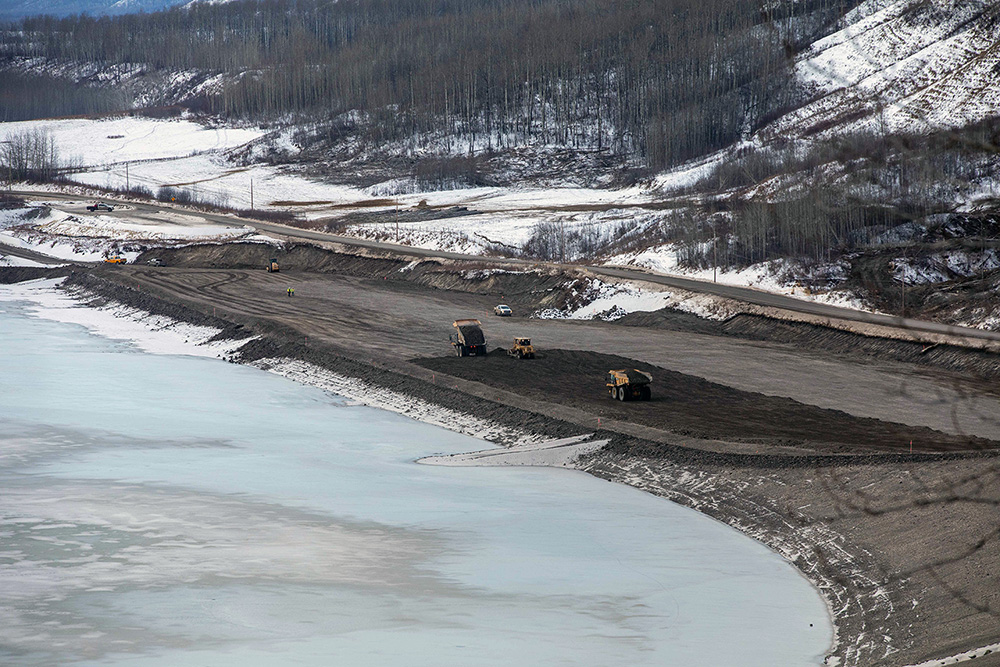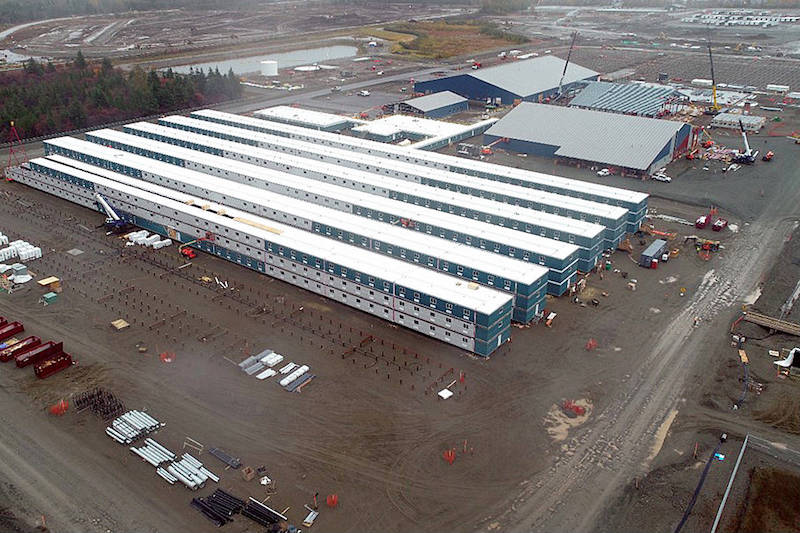It was a quiet Christmas in Witset, a Wet’suwet’en community of 800 people. Church services were held online, relatives were told to stay away from family gatherings and social interactions were limited to phone calls and physically distanced baking exchanges.
Round-the-clock security checked on Elders and enforced public health orders. They were hired by the community, which successfully gained control of a cluster of COVID-19 cases brought from industrial work camps last month.
Given the sacrifices, residents like Ron Mitchell, Hereditary Chief Hagwilnegh, wonder why a B.C. public health order temporarily reducing the number of people in work camps in the region doesn’t go further.
The camps are still allowed to house hundreds of workers, while gatherings in his community are limited to a single household.
“We are not allowed to have family gatherings of six and yet these camps, they’re going to scale down to 400? Give me a break,” says Mitchell, who says the camps should be shut down until the danger of COVID-19 has passed.
“It just doesn’t make sense to me. My kids didn’t come back from Vancouver and yet to have these camps with hundreds of people — some of them probably went home and back,” he said. “Frankly, I don’t think scaling back is enough. Up to now, they’ve been going full blast, and that’s affected a few communities, COVID-wise.”
In the order that was announced before the holidays and issued Dec. 29, B.C. provincial health officer Dr. Bonnie Henry said a mass post-holiday return of workers to the camps presents a health hazard in the North and that there is “an immediate and urgent need” to reduce the spread of COVID-19 associated with industrial projects.
It describes a “rapid increase in the number of persons infected with COVID-19 associated with large-scale industrial projects” in the Northern Health Authority.
The work camp transmissions have created clusters, outbreaks and transmission in surrounding communities, including First Nations, the order says, and tax local health-care systems.
Henry’s order applies to specific projects within the Northern Health region. It limits the number of onsite workers for now but allows an increase as companies produce approved restart plans.
“A rapid return to full operating capacity... will likely further fuel and accelerate the cycle of transmission of COVID-19 among the workers and the surrounding communities,” it says.
Mitchell says many of the dozen COVID-19 cases in Witset late last year could be linked directly to LNG Canada’s Kitimat worksite and worker accommodations for the Coastal GasLink pipeline. Both experienced outbreaks in November and December.
At LNG Canada, two outbreaks declared in mid-November and mid-December resulted in 72 cases. There are currently no active cases and the first outbreak has been declared over, according to Northern Health.
On Dec. 19, the health authority declared an outbreak at two work camps for the Coastal GasLink pipeline, one at Seven Mile Lodge in Burns Lake and the other at Little Rock Lake Lodge near Fraser Lake. In a Dec. 31 update, the authority said six of 53 cases remained active.
Both Coastal GasLink work camps are under an additional order from Northern Health allowing only essential workers until the health authority approves an updated COVID-19 safety plan.
The camps are also included under the broader public safety order issued by the provincial health officer. It affects five projects operating across the region: the Coastal GasLink pipeline; the associated LNG Canada plant in Kitimat; the Site C hydro project in the northeast; the Trans Mountain Pipeline; and Rio Tinto Kemano, also in Kitimat.

Effective Dec. 29, the projects were ordered to limit the number of onsite workers to a baseline set by the health officer. At Coastal GasLink, the baseline is 400 workers on site at a time.
In its most recent update, Coastal GasLink said that at the end of November it had 4,000 workers spread across the project with worker accommodations ranging from about 100 to more than 600 occupants.
If the company submits a restart plan, which must be approved by the provincial health officer and Northern Health’s chief medical health officer, it can add 600 workers for a total of 1,000 after Feb. 1.
The baseline number for Site C and LNG Canada is 400 and 450 workers respectively, down from several thousand in the fall. LNG Canada says that prior to the December holiday drawdown, the number of people employed at its project site in Kitimat had surpassed 3,200, with about two-thirds of that number actually working onsite at any given time.*
But those baseline numbers could change as early as today.
If the provincial health office approves the restart plans, both projects could add 400 workers. By late January, each project could increase its workforce to 1,100 people.
The Trans Mountain pipeline expansion project was limited to 50 workers by the order. But it will be permitted to expand to 600 by early February. And the restrictions apply only to the project’s workforce within the Northern Health Authority.
Rio Tinto Kemano’s 160-person baseline increased to 280 workers on Friday and is expected to remain at that level into February.
The B.C. Health Ministry issued a statement saying it “anticipated that companies will continue to work with Northern Health and the PHO to further refine numbers through the month of January and a further ramp up is planned for into February and beyond.”
The order limiting the number of workers does not have an expiration date and states that project managers must be prepared if the medical health officer orders a “partial or a full work stoppage.”
Projects must also limit the movement of workers between sites. Workers who are moved from one site to another cannot be moved again for two weeks, the order states.
Anne Ketlo lives in Nadleh Whut’en First Nation, a community of about 200 people located 10 kilometres from Coastal GasLink’s Little Rock Lake Lodge. She said COVID-19 cases began to spread in the camp after the company transferred pipeline workers from Seven Mile Lodge in Burns Lake.
The community, which has security patrolling to ensure residents comply with public health orders, has successfully kept the virus out. But Ketlo has lost two family members and had several others fall ill over the past month from a cluster of COVID-19 cases at Nak’azdli Whut’en First Nation in Fort St. James.
She’s skeptical that a reduction in camp workers will keep nearby communities safe.
“I would say that safer practices need to be put in place, because Nadleh spent hundreds of thousands of dollars protecting our community from COVID and we have been very militant, because of the Elders that we have left,” she says.
“It’s scary. We have a very young community, but the Elders that we have, we utilize them to the utmost in all of our cultural practices, our ceremonies, and especially our languages.
“CGL put us at risk.”
Ketlo points out that even if Coastal GasLink returns to full operations in February, it may be short-lived. Last March, when the pandemic first began raising concerns about work camps operating in the region, the pipeline company pointed to spring thaw, when heavy machinery cannot be used in some areas, as a reason to scale back operations.
The Tyee asked Coastal GasLink for an interview to answer questions about the orders.
The company refused the request and directed The Tyee to information posted on its website. The company says it is working with prime contractor Pacific Atlantic Pipeline Construction to monitor COVID-19 cases at Little Rock Lake Lodge and Seven Mile Lodge and that both camps remain closed to non-essential workers while they develop remobilization plans.
Coastal GasLink’s 670-kilometre pipeline, which begins in the northeast and is currently under construction across the North, will connect to the LNG Canada terminal in Kitimat.
A spokesperson for LNG Canada said the public health order’s return-to-work schedule enables it to “progress seasonally critical work scopes” and it remains committed to project timelines.
“LNG Canada has and will continue to abide by all directions and orders from the Office of the Public Health Officer and other public health authorities,” the company said in an email.
According to Site C’s website, there were 489 people in camp on Tuesday, three of them in isolation. The project has seen 30 COVID-19 cases since March, all of which have recovered, according to BC Hydro.
“Our top priority on the Site C project will always be the health and safety of our employees, workers and members of the public. We are committed to implementing all components of the order and are currently in discussions with our major contractors to work out the details,” community relations manager David Conway said in an email.
“In the days ahead, we will be working closely with health officials and our contractors on a safe and staged plan to slowly increase the number of workers staying at camp to a maximum of 1,100 by the end of January. The order does not impact people working on the project that live locally or those that work on off-dam site activities such as clearing, transmission construction and Highway 29 work.”
He added that the order will affect the dam’s schedule and cost, which has increased by several billion dollars since it was first announced by the previous Liberal government.
Dr. David Bowering, Northern Health’s former chief medical health officer, has been critical of the decision to allow work camps to continue operating during the pandemic.
In the spring he wrote an open letter calling on Henry to close the camps.
He said the limits imposed in the order were “absolutely bizarre” and questioned the transparency around how they were developed.
LNG Canada and Health Ministry spokespeople did not respond to questions about whether industry was involved in the decision-making process.
“What are those numbers based on and why is there this assumption that they can progressively return to full speed by early February?” Bowering asked.
“For example, churches that are shut down, they’re not given two weeks and then you can have half your congregation back and then by February you can have your full congregation, as long as you present us with it with a safety plan,” he says. “This is the government’s church, and it’s irrational. They should have to play by the same rules as everyone else’s, in my opinion.”
Bowering says he would like to see the province address the fact that workers from across B.C., and other provinces, spend weeks in the camps before returning to their home communities. He would like to see an order reduce projects to skeleton crews until inter-provincial travel is permitted for everyone.
“I would have loved to have seen them address that and say, ‘We need to pare down to essential levels,’” he said.
On Monday, Henry announced 2,211 new COVID-19 cases over the previous four days, including 169 new cases in the Northern Health Authority — an average of more than 42 per day. She said First Nations communities, and Elders in particular, will be a priority for vaccination.
Henry has not, however, responded to two recent letters from Wet’suwet’en Hereditary Chiefs.
In late November, 22 Wet’suwet’en Ts’ako ze’, or female chiefs, wrote a letter to Henry asking her to reconsider the province’s designation of large industrial projects as essential services. The nation’s Dinï’ze, or male chiefs, followed with a letter of their own a week later.
Neither has received a reply, Mitchell of Witset says.
“There was no response, no public response, nothing,” he says. “It’s worrisome. [The camps] are the ones that are going to keep this partial lockdown in place.”
*Story amended on Jan. 7 at 9:19 a.m. to clarify that most workers on the LNG Canada project are employed by contractors. ![]()
Read more: Indigenous, Coronavirus, Labour + Industry
















Tyee Commenting Guidelines
Comments that violate guidelines risk being deleted, and violations may result in a temporary or permanent user ban. Maintain the spirit of good conversation to stay in the discussion.
*Please note The Tyee is not a forum for spreading misinformation about COVID-19, denying its existence or minimizing its risk to public health.
Do:
Do not: